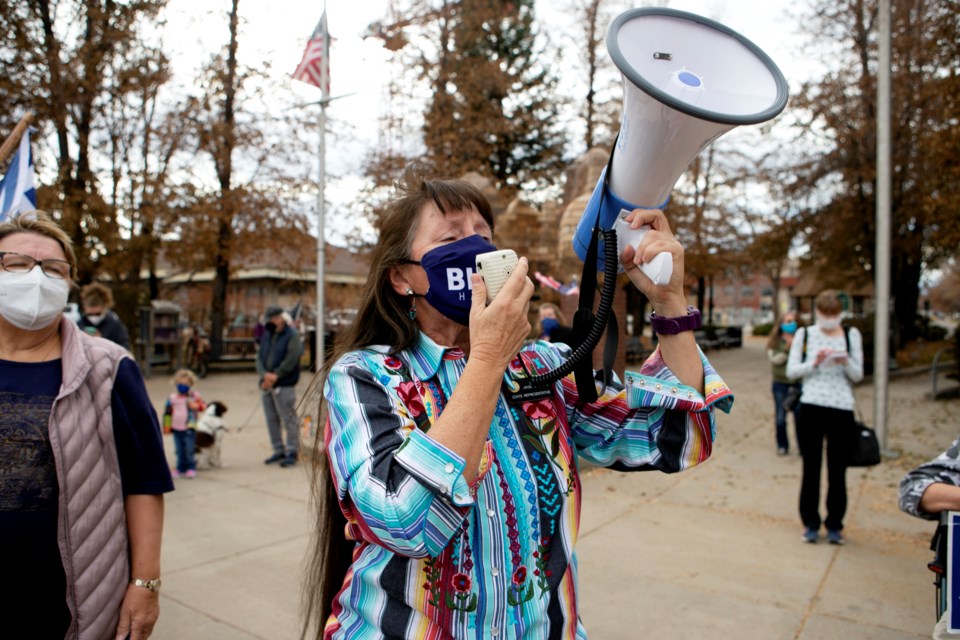The state senator representing Longmont is more than a little concerned about a case that went to the Supreme Court last week.
Sen. Sonya Jaquez Lewis (D-Lafayette) feels the outcome of 303 Creative LLC v. Elenis, the case asking whether a wedding website creator may legally refuse to make websites for same-sex couples on First Amendment grounds, could have major ramifications for the LGBTQ community.
“As someone who’s been out as a lesbian for 45 years and was just feeling like maybe I didn’t have to work so hard on this issue anymore, then to see what is happening with the Supreme Court, it’s just outrageous,” she said.
At the heart of the case, which the Supreme Court debated for over two and a half hours on Dec. 5, is Colorado’s public accommodation law that requires a business offering their services to the public to provide that service to all customers.
Lorie Smith, a website designer based in Littleton, wants to begin offering wedding websites but does not want to create them for same-sex marriages due to her religious beliefs. Notably, no same-sex couple has yet asked Smith to provide these services.
“They’re basically ruling on a situation that hasn’t happened, and that is very scary to me because that tells me the conservatives on the Supreme Court are going to stamp it in a way that is of their liking, not based on any law, based on a hypothetical,” Jaquez Lewis said. “That is a turn in a dangerous direction for this country, I believe.”
The court case holds several parallels to a Supreme Court case that also came out of Colorado five years ago. In that case, a Colorado baker from Lakewood objected to a wedding cake for a gay couple and the Supreme Court ruled in his favor, though the cased ended with a limited decision.
The Supreme Court’s conservative majority sounded sympathetic to Smith, according to Associated Press reporting. The court is currently made up with a majority 6-3 conservatives and follows a series of cases in which the justices sides with religious plaintiffs.
Jaquez Lewis fears a ruling siding with Smith and the ramifications it would have across the country and in Longmont.
“If this ruling goes in her favor, then a business in Longmont could do the same thing, even though Colorado clearly has those laws, even though Boulder County has many of those laws, same thing with Longmont,” she said. “If the Supreme Court reaches out and supersedes what our community has set aside as the kind of life that we want to have here in Colorado … that will jump out into communities all across the county and into our community and say discrimination can now occur.”
Jaquez Lewis connects this court case to the anti-LGBTQ rhetoric that has grown more mainstream in recent years. She recalled a picture posted of her and four other LGBTQ members of the Colorado legislature captioned, “Meet Colorado’s newest groomers,” a buzzword of right-wing rhetoric targeting LGBTQ people.
“The clear meaning is these people should not be allowed to do what they’re doing, meaning we as elected officials should not be elected officials and, you know, someone should take action against us,” Jaquez Lewis said.
She notes that the hate speech that has arisen in the past several years connects directly to the threats, violence and now murders of the LGBTQ community, like the mass shooting last month at Club Q in Colorado Springs.
She fears that a Supreme Court ruling that allows people to discriminate against members of the LGBTQ community on religious grounds will sanction further hatred.
“If people think that this ruling, which we think is going to happen in this case, if people think that is not going to send a clear message to the homophobes, to the bigots, to the haters that hey, you can do it now, I don’t know what else would,” Jaquez Lewis said. “That’s the part that just really scares me.”
She sees this continued rhetoric as a sign that her work in the state is far from done. As a co-sponsor or prime sponsor of every LGBTQ bill that Colorado has had since 2019, the senator plans to keep fighting for more LGBTQ protections, like repealing the gay marriage ban still written into the state’s constitution.
“What can we do to try to mitigate, to try to lessen this hatred?” Jaquez Lewis said. “Because we know that it continues to perpetuate the bullying in schools and the violence that occurs in our communities. I think raising a light on it is really what’s needed.”



